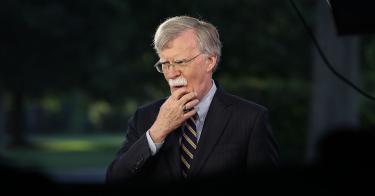The Justice Department on Wednesday unsealed charges against a member of Iran’s Revolutionary Guards for attempting to arrange the murder of former National Security Advisor John Bolton.
Prosecutors accused Shahram Poursafi, who remains at large abroad, of trying to pay U.S.-based individuals $300,000 to assassinate Bolton. The charges were based on information provided by a confidential human source.
U.S. officials said the disrupted plot would have been retaliation for the U.S. military’s January 2020 killing of Gen. Qassim Soleimani in a drone strike in Iraq.
As the leader of the Quds Force, the elite special-operations wing of Iran’s Islamic Revolutionary Guard Corps, Soleimani orchestrated attacks against U.S. troops in Iraq and Syria by proxy militias and terrorist groups controlled by Iran.
Although Bolton had resigned from the Trump administration before the 2020 drone strike against Soleimani, he was a hard-line driving force behind U.S. efforts to roll back Iranian influence, including the 2019 designation of the Islamic Revolutionary Guard Corps as a foreign terrorist organization.
Bolton is not the only former U.S. official that has been targeted for assassination by Iran. Former Secretary of State Mike Pompeo and former State Department Iran policy coordinator Brian Hook also have received extended Secret Service protection due to Iranian threats.
Iran’s Revolutionary Guards also were caught red-handed in a foiled plot to assassinate the Saudi ambassador to the United States by bombing a restaurant in Washington D.C. in 2011.
Mansour Arbabsiar, an Iranian-American who had been enlisted by a cousin who was a high-level Quds Force official, pleaded guilty and was sentenced to 25 years in jail. Arbabsiar may have paid a heavy price for his involvement in the plot, but the Iranian regime escaped without any penalty.
By treating state-sponsored terrorism primarily as a law enforcement problem rather than as a national security issue, the Obama administration let Iran’s regime off the hook and emboldened it to operate with impunity. The Biden administration should not repeat the same mistake of sending a dangerous sign of weakness to a regime that has relied heavily on terrorism to maintain itself in power since 1979.
The plot to assassinate Bolton is another reminder, if any was needed, that Iran’s hard-line Islamist rulers pose lethal threats to the United States and cannot be trusted.
Yet the Biden administration has rejected the Trump administration’s "maximum pressure" policy against Iran and continues its misguided efforts to revive the defective and increasingly irrelevant Iran nuclear deal.
Turning a blind eye to Iranian terrorism in a complacent effort to appease Tehran and sign another risky nuclear agreement would be a huge blunder that would undermine U.S. national security for years to come.
This piece originally appeared in Fox News



